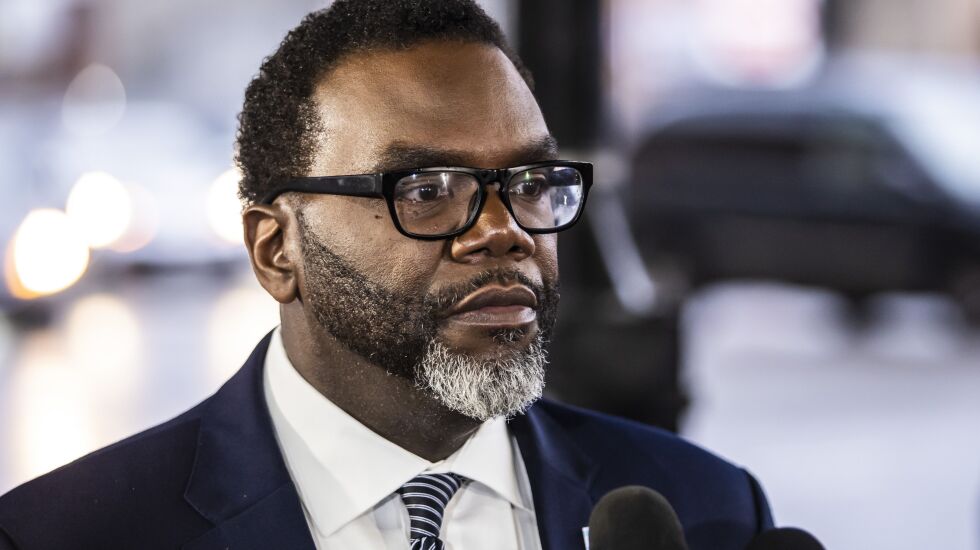
In the days after he won the run-off election, Mayor-elect Brandon Johnson conducted a series of local and national interviews in which he recommitted to a comprehensive program for enhancing public safety across the city and reforming the Chicago Police Department. In particular, he emphasized a holistic approach to public safety, providing much-needed services and resources to neighborhoods experiencing high levels of crime.
According to polling around the election, most Chicagoans embrace this approach to addressing root causes of public safety challenges, including fully funding good schools, affordable housing, and accessible treatment for mental health and drug addiction. Most Chicagoans also back plans to scale up alternative response models so that trained professionals, rather than law enforcement, respond to 911 calls involving people in mental health crisis.
While he pursues these commendable long-term goals, the mayor-elect also should move quickly to increase the city’s compliance with the consent decree governing the Chicago Police Department. He must exercise direct leadership over the process of implementing the decree, and make clear that transforming the culture to change how residents experience policing is a top priority.
The decree, approved by a federal court in 2019, is a wide-ranging, detailed plan to address CPD’s deep-seated failures to police according to the law. Over the past four years, the city has fallen woefully short in implementing the decree’s required policy changes, training and accountability measures. This slow pace has led many in the city — including community partners represented by the ACLU — to fear that meaningful opportunities for change at CPD are being squandered.
Three steps, done right away
The new Johnson administration should embrace three immediate steps to invigorate consent decree compliance. Each of these steps is well within the power of the new mayor to push in his first days in office.
First, the new Johnson administration should move quickly to fully staff CPD’s Office of Constitutional Policing and Reform, the unit charged with overseeing and implementing the consent decree. Although budgeted for over 40 positions, the office has less than half of those staff in place today, and also needs a new leader who enthusiastically embraces transformational change and has the authority and resources to move quickly to implement the consent decree.
Fully staffing the office and giving its leader the power to initiate changes necessary for reform is a good step forward.
Second, the new mayor and his team should swiftly commit to a search warrant policy that bans no-knock warrants and nighttime raids, necessary changes embraced by other cities and states.
There is broad public support for these changes to CPD’s search warrant policy in the wake of the dehumanizing, wrong raid on Anjanette Young and numerous raids of other Black and Brown residents, including children, in Chicago. CPD’s 2023 policy does not go far enough to prevent violent and degrading raids. The mayor can order CPD to adopt a new search warrant policy that meaningfully considers whether the potential gains from executing a warrant are outweighed by the risks, especially risks to children, people with disabilities, and people with limited English proficiency.
Such a new policy also should hold officers and supervisors accountable for wrong raids, creating a system that curbs excessive and racist behavior.
Third, the new mayor should move to overhaul and upgrade training on key issues covered by the consent decree, including the use of force by officers, the First Amendment rights of protestors and rules on when police can (and should) stop pedestrians and motorists in Chicago. This requires fully staffing CPD’s training unit and ending the practice of detailing trainers out to patrol duty.
Training is a critical step in assuring that the policies and goals set by CPD leadership (including a robust Office of Constitutional Policing and Reform) actually are implemented consistently in every neighborhood. For too long, the city has resisted rigorous, community-informed training. A community working group that observed CPD’s use-of-force trainings recently reported that trainers undermined the intended message by suggesting that officers’ safety was more important than the safety of community members, and that trainings were biased and ineffective in other ways. Shifting CPD’s culture requires an immediate, serious focus on re-training CPD officers to do their jobs effectively and constitutionally.
After an election campaign that too often offered binary choices about public safety and policing, Johnson has an opportunity to embrace a new, nuanced direction that improves long-term stability and safety for everyone throughout the city. But turning this opportunity into reality will take action — immediate action.
Taking these three steps will begin to put into effect the promise of a new approach that can benefit Chicago not just for the next four years, but for decades to come.
Alexandra Block is a senior supervising attorney with the ACLU of Illinois Criminal Legal System and Policing Project.
The Sun-Times welcomes letters to the editor and op-eds. See our guidelines.
The views and opinions expressed by contributors are their own and do not necessarily reflect those of the Chicago Sun-Times or any of its affiliates.







